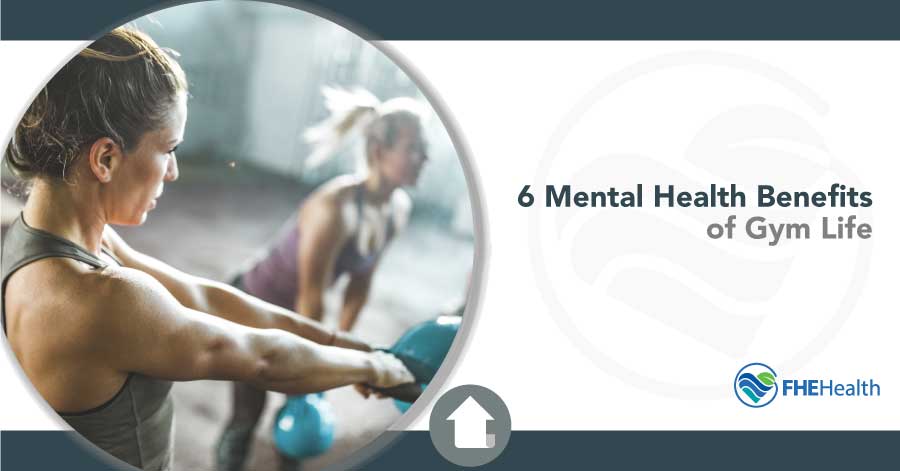
When you picture a healthy, well-rounded person who has their life together, you probably imagine someone who works out regularly and sticks to a healthy diet. Common advice when facing depression or a significant life change is to “hit the gym” to improve your mood. But is the culture around gym life healthy? And, is there anything to beware of? Let’s take a look at the connection between gym life and mental health and what kind of benefits you might gain by becoming a gym rat.
Gym Life and Mental Health: Six Benefits You Can Gain From Hitting the Gym
1. Social Benefits
One of the main benefits of starting a fitness routine is the social connections you can forge. Making friends at the gym is relatively easy if you go to classes or visit at the same time every day. You start noticing the regulars and can initiate a conversation with people by asking questions about their fitness routine or for tips about working out. If you’re struggling with mental health conditions like depression, this opportunity to socialize may be a welcome change.
Even if you don’t make friends at the gym right away, it can benefit your mental health to get out in public. Attending fitness classes can make you feel like you’re part of a community and help battle feelings of isolation.
2. Increased Confidence
Another benefit of regularly attending a gym is a boost in your self-esteem. You’ll likely see physical changes in your body after working out. After a while, you may notice that you’re getting stronger and see the positive rewards of all your hard work. This also has the added benefit of proving to yourself that you can stick to your goals, work hard, and enact change in your own life.
Countless studies have shown that increased physical activity can positively impact a person’s self-esteem, both directly and indirectly. Improved confidence will also have a pervasive positive impact on other areas of your life. As your self-esteem improves, you may find yourself more confident at work, in dating, in relationships, and in social situations.
3. Endorphins
You’ve probably heard of or experienced a post-workout “high.” After a run or workout, you’re in a much better mood. That’s because when you work out, your body releases endorphins. These naturally produced chemicals react in the brain to reduce pain and increase pleasure.
Many people who struggle with depression, anxiety, or other mental health conditions are encouraged to work out for this reason. Of course, it’s important to note that working out isn’t a cure for these conditions. Instead, it offers relief and can help people feel better.
4. Better Sleep
When you exercise regularly, you tire out your body. This means you’re more likely to have a full night’s sleep, as well as more restful sleep. This is especially important for those living with mental health conditions. Insomnia and sleep problems are common for people with anxiety, depression, PTSD, and other disorders.
5. Reduced Stress
According to Stress in America, a January 2021 survey reported that 84% of respondents felt prolonged stress during the prior two weeks. Chronic stress can have long-standing consequences for physical and mental health. Unfortunately, dealing with mental conditions can also cause a lot of stress.
Luckily, exercise can help. An increased heart rate can reverse brain damage caused by stress by stimulating the production of neurohormones. And when you exercise, your body’s central and sympathetic nervous systems work together. This collaboration helps the body respond to stress in the moment and later on.
6. A Focus on Health
In general, people who work out regularly tend to start taking all aspects of their health more seriously. This usually means they eat a healthier diet, drink less, meditate, and more. If you’re recovering from addiction, the gym offers another benefit: a sober community. You can surround yourself with people who understand the benefits of not drinking.
Watching Out for the Dark Side of Gym Life
Of course, it’s essential to watch that gym life and mental health don’t swing too far to the other extreme. The “gym rat lifestyle” is where fitness almost becomes an obsession and individuals start to put going to the gym ahead of other priorities in their life. This can potentially cause problems in your relationships and lead to body dysmorphia or eating disorders.
An intense gym routine isn’t without its risks. You should be careful about pushing yourself, enabling too much competition, or letting it dominate everything else in your life. Don’t let the gym become an unhealthy addiction or obsession.
Additionally, it’s important to understand that the gym isn’t a cure-all. While going to the gym can have a positive impact, it’s not going to cure a person’s depression, PTSD, or anxiety. Pushing the gym as a solution to every problem is a form of toxic positivity. It’s the idea that taking care of your physical health will automatically help your mental health. While the two are related, it’s irresponsible to spread the message that something as serious as depression can be cured with regular spin classes.
While you may see many benefits from gym life, mental health issues should be diagnosed and treated by a medical professional. If you need help, seek it.
Get Support From FHE Health
FHE Health has helped thousands of individuals face mental health and substance abuse issues. Just like going to the gym is all about taking care of your physical health, getting mental health support is about taking care of your mind. Our trained and compassionate counselors are here to help. Get started today by calling (833) 596-3502.






